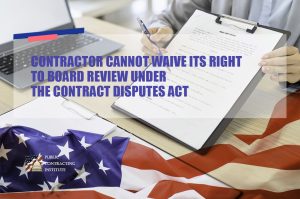A recent Armed Services Board of Contract Appeals (“ASBCA”) case confirms the fact that a contractor may not assign claims to a surety that waives the contractor’s right to appeal a contracting officer’s decision to the Board. Ikhana, LLC, ASBCA Nos. 60462 et al., Oct. 18, 2017.

The government awarded Ikhana a contract to construct access lanes and remote screening facilities at the Pentagon. In connection with the contract, Ikhana executed performance and payment bonds with a surety, the Guarantee Company of North America. Part of the consideration the contractor offered was an indemnity agreement which stated that if an “event of default” occurred by Ikhana (defined as: the government declaring Ikhana in default, or Ikhana breaching any terms of the indemnity agreement, or the surety making a payment on any bond), then Ikhana agreed to assign to the surety a possessory right to collateral—which included “contract rights.” Also, in the event of such a default, the surety could prosecute or settle any claim in its sole and absolute discretion.
Ikhana encountered performance problems, and filed four claims with the contracting officer, but the contracting officer never issued a final decision on any claim. About two months later, the government terminated Ikhana’s contract for default. Ikhana appealed both the termination of default as wrongful, and the deemed denial of its claims.
The government negotiated with the surety, and agreed to make a payment for completion of the contract, while the surety agreed it would cause the dismissal of the appeals and release the government from any claims regarding the contract. In the appeal, the government moved to dismiss the appeal, alleging that Ikana lacked standing and the surety was the real party in interest. The surety moved to intervene and withdraw the appeals. The Board denied both the government and the surety’s motion, maintaining the appeal.
The Board framed the issue as: Whether Ikhana assigned the claims subject to the appeals to the surety, and if so, whether that assignment precluded Ikhana from bringing these appeals. The Board stated that even if there was an assignment, such an assignment would not preclude Ikhana from bringing the appeals. Noting that the Contract Disputes Act, 41 U.S.C. §§ 7101-7109 guaranteed at least one impartial review of contracting officer decisions, the Board pointed out that “permitting parties to contract away Board review entirely would subvert this purpose,” citing Burnside-Ott Aviation Trg. Ctr. V. Dalton, 107 F. 3d 854, 859 (Fed. Cir. 1997). Burnside-Ott holds that a contractor cannot waive its right to appeal a contracting officer’s decision to a Board. The Board noted that the indemnity and settlement agreements impermissibly attempted to deprive the Board of its power to hear the appeals, which fell under the Contract Disputes Act. Ikhana had an unwaivable Contract Disputes Act right to Board review of the contracting officer’s default decision and deemed denials of its claims.
The Takeaway: Sureties should be aware that agreements to cause a contractor to waive its Contract Disputes Act rights for review of a contracting officer’s final decision will not be honored. If a surety is upset with what happens, it must work through the contractor on a claim or a settlement. Contractors should be aware that they cannot assign to a surety as collateral the contractor’s right to a Board review of a contracting officer’s decision on an underlying contract. Such as assignment will be deemed unlawful, and will not be honored
For other helpful suggestions on government contracting, visit: Richard D. Lieberman’s FAR Consulting at https://www.richarddlieberman.com/, and Mistakes in Government Contracting at https://richarddlieberman.wixsite.com/mistakes.
